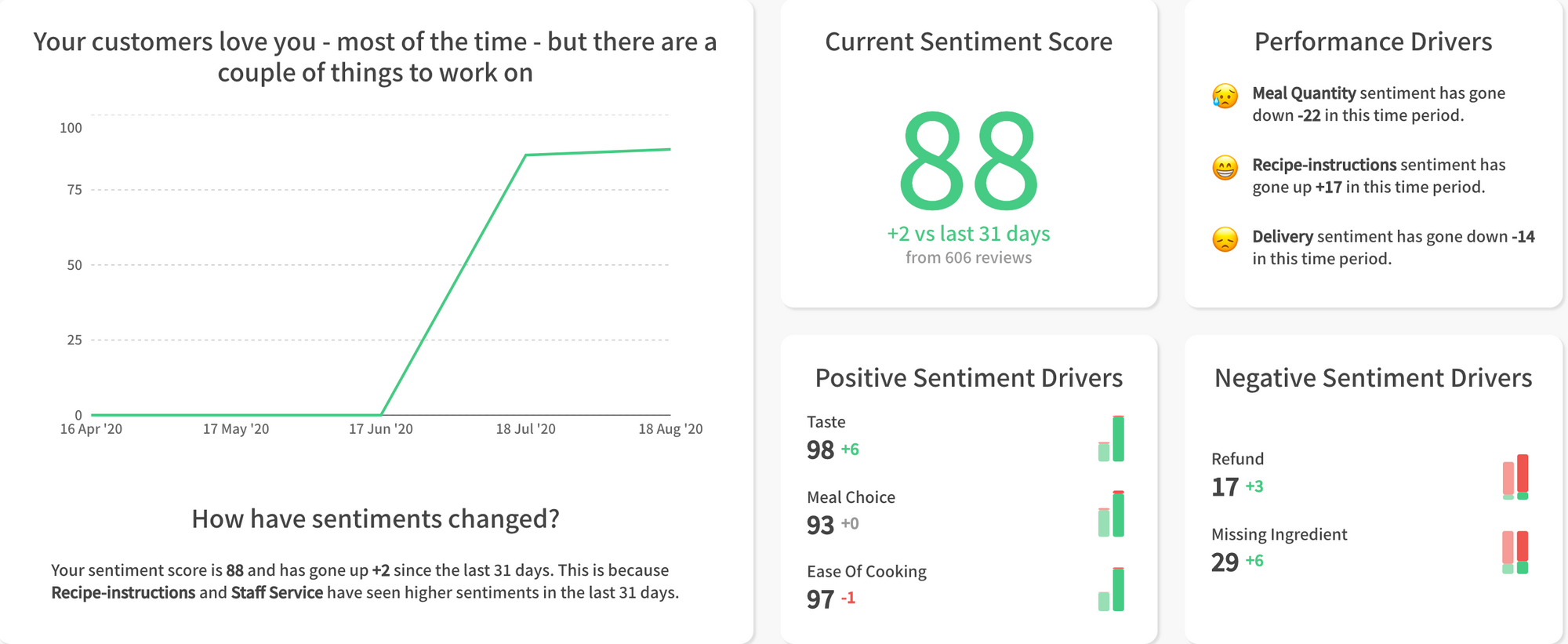The direct-to-consumer business model allows companies to own both brand and customer experience, and it offers an opportunity for organisations to build close customer relations, lower third-party costs and innovate across the customer journey.
Scaling a company is not easy for any company, and that is no different in the D2C space. Organising people, creating efficient operations, personalisation and staying in touch with market dynamics are all obstacles to successfully scaling up.
Today customers expect a seamless service from their favourite brand, which, when compromised, can have far-reaching consequences.
Here we present the seven challenges that D2C brands face while scaling up and the tools they can use to solve those challenges.
1. Problem: Tackling customer churn and staying in touch with customer needs
D2C provides greater control over customer data which is of great value. This data can be analysed further to determine customer behaviour, tackle customer churn, and formulate customer acquisition strategies. When a D2C brand scales up, customer churn often becomes untenable and challenging to manage. Moreover, the interaction point of customers with the brand also increases from mere website to chats, emails, calls, SMS and reviews. In such a situation, a D2C brand may lack the time and resources to collect, structure, process and deliver insights from the data. With so many customer interactions, it is critical to understand your customer precisely and to deliver to the standards they expect.
Solution: SentiSum

SentiSum, a customer analytics software, helps to reduce customer friction by providing real-time insight from numerous customer interaction channels. SentiSum offers a customised AI model which improves itself all the time and helps to uncover the root cause of customer friction. These insights are helpful to take proactive actions and tackle customer pain-points. Trusted by industry-leading organisations, SentiSum also offers integrations like their Zendesk Chat Analytics Integration, Trustpilot, Salesforce, Freshdesk and many more.
2. Maintaining mentally healthy and balanced employees
When a D2C brand scales up the workload increases. Increased workload is one of the biggest reasons for mental health disorders, and such disorders often go unnoticed in the chaos of scaling. There is a stigma around mental health, and often employees do not want to come out and talk about it. Not all employees experience this burnout, but cases might affect the overall performance of the team, project or even the organisation at times. Therefore, it is always advised to be ready with mental health solutions not only to achieve professional targets but also to change attitudes across the organisation.
Solution: Spill

Spill, a four-question survey on Slack, identifies employees who need extra emotional support and offers them free therapy session with trusted professionals. Spills provide a variety of tools and exercises; for example, it enables employees to ask questions to a therapist anytime. Employees can talk to the therapists using any medium like video, call, SMS, email etc., thus providing utmost flexibility and promising comfort.
3. Problem: Creating personalised experiences that drive sales
For a D2C brand, personalisation can be the key to successful customer-brand interactions that boost bottom-line growth. Personalisation is very tough to implement because of its high demand for data. Customers have diverse demand in terms of products, and this demand may vary on a seasonal and geographic basis. These customers can be segmented and target accordingly to strengthen the relationship. A scaling D2C brand needs to target new and diverse user groups with its marketing campaigns and strategies to drive market penetration. In such cases segmenting the users and building up a personalisation strategy for each of them can be a herculean task.
Solution: OptinMonster

OptinMonster, a personalisation tool, can help to generate more subscribers, leads and sales by analysing the website traffic. It starts with creating a visually stunning offer using pre-built templates with drag and drop features that aim to maximise conversions. Using behaviour automation, the offer can be shown to the audience best suited for it at the right time. Finally, the experiment can be put live, and the data analysed to improve conversion rates further. With its simple and minimal setup, OptimMonster ranks #1 personalisation tool in the world.
4. Problem: Winning customers from competitors
The online retail landscape is frequently changing, more and more incoming brands are taking their business online, especially amid COVID-19. A number of these retailers and brands are D2C in nature and built from the ground up with best-in-class customer acquisition and retention strategies. In such a scenario, competitor analysis plays a vital role for a D2C brand planning to scale up. Competitor analysis highlights not only your strengths but also your shortcomings. It tells you your risk points and opportunities relative to the traditional and non-traditional competitors out in the market. A poor analysis might lead to failure in understanding the competitive landscape and losing out on precious customers.
Solution: Ahref

Ahref, an SEO software suite, provides resources and tools that assist in link building, keyword research, competitor analysis, site audits and many more. Ahrefs helps to analyse the competitor pages to suggest content opportunities, research the quality of backlinks and also highlight low competition words with high intent. All of which allows your business to increase visibility in search engines and generate more leads.
5. Problem: Ensuring legal compliance
Contract management holds the utmost importance when it comes to mitigating business risk. A D2C brand scaling up will have an increasing number of contracts with everyone from employees to third-party vendors, all of which carry potential risks if not handle properly. In such cases, contracts need to both be made right and efficiently. A poorly managed contract can later cost an organisation hefty sum of money, drive negative PR, and leave revenue opportunities on the table.
Solution: Juro

Juro, a contract automation platform, enables organisations to create and manage contracts at scale. Juro saves a significant amount of legal time, allowing teams to collaborate, comment, and edit multiple versions. Juro makes contracts accessible: mobile-friendly and automatic e-signatures. Juro is available for HR teams, sales team, developers and legal teams and provides integrations across tolls that you use every day.
6. Problem: Efficient People and Work Management
A scaling D2C brand needs to manage its project's objectives and timelines, so nothing is late or gets lost. The tasks may increase, and deadlines may be tight. The people in the organisation are the ones who are going to take the company forward, but this is only possible if the D2C brand has planned for proper people and work management. Such a management strategy should have motivation, development, transparency and teamwork at its core. A poor strategy may affect the organisation at different levels starting from conflicts to lack of recognition and compromised quality of tasks completed.
Solution: Asana

Asana, an automated team and work organiser, is featured with tools that help every team across your organisation when it comes to day-to-day work, strategic goal planning and employee syncing. Asana offers solutions to a variety of businesses in terms of size and demand for security. It also provides integrations with apps that you use every day like Microsoft Teams, Outlook, Jira and Zapier.
7. Problem: Streamlining the fulfilment process
Over the last few years, consumers' attention has shifted from legacy retailers to smaller, more nuanced direct-to-consumer businesses. The increase of online shopping, the decrease of retail football, the vast shock in brand loyalty, and the rest of the pandemic's effects on the retail industry have only strengthened that trend. Scaling your D2C business translates into an increasing number of orders that need to be shipped as fast as possible to your customers. Introducing automation and thus reducing the administrative overhead of your warehouse team can save you time and money so you can focus more on developing your business and less on fulfilment.
Solution: Shiptheory

Shiptheory is a cloud-based shipping management platform that connects retailers with the world's best carriers like Royal Mail, USPS, FedEx, and more, to automate shipping labels, manifests, and tracking. Shiptheory imports orders automatically from all your sales channels like your Magento, Shopify, or Xero account, into a single, easy-to-use platform that offers multiple-user support, advanced reporting features, and an excellent customer support team.
Shiptheory's intelligent shipping rules engine allows you to automate every step of your shipping process based on a combination of shipping destination, order weight, value, product SKU's, and more. Additionally, Shiptheory's in-depth shipping reporting suite provides the vital decision-making data you need to identify the most popular delivery services and spot cost reduction and customer service improvement opportunities ahead of your competition.
Conclusion
As the world of e-commerce evolves day by day, brands will adopt the D2C approach rapidly. This will introduce new challenges at the stage of market entry as well as at the stage of maturity. Organisations will need new tools and techniques to survive and grow.
A large number of tools are introduced every day for every possible size of business. Each tool promises distinct features which can be utilised as per the use case. And with the right set of tools, a D2C brand can surely excel the market entry stage as well as scaling up process
Author: Nilay Jayswal

Nilay is a marketer at SentiSum with expertise in customer insights software for e-commerce brands. SentiSum is an AI-powered customer analytics platform that specialises in extracting granular insights in real-time from customer support tickets, surveys and customer reviews. Get all your customer feedback in one, easy to use platform, so you can start tackling churn drivers.